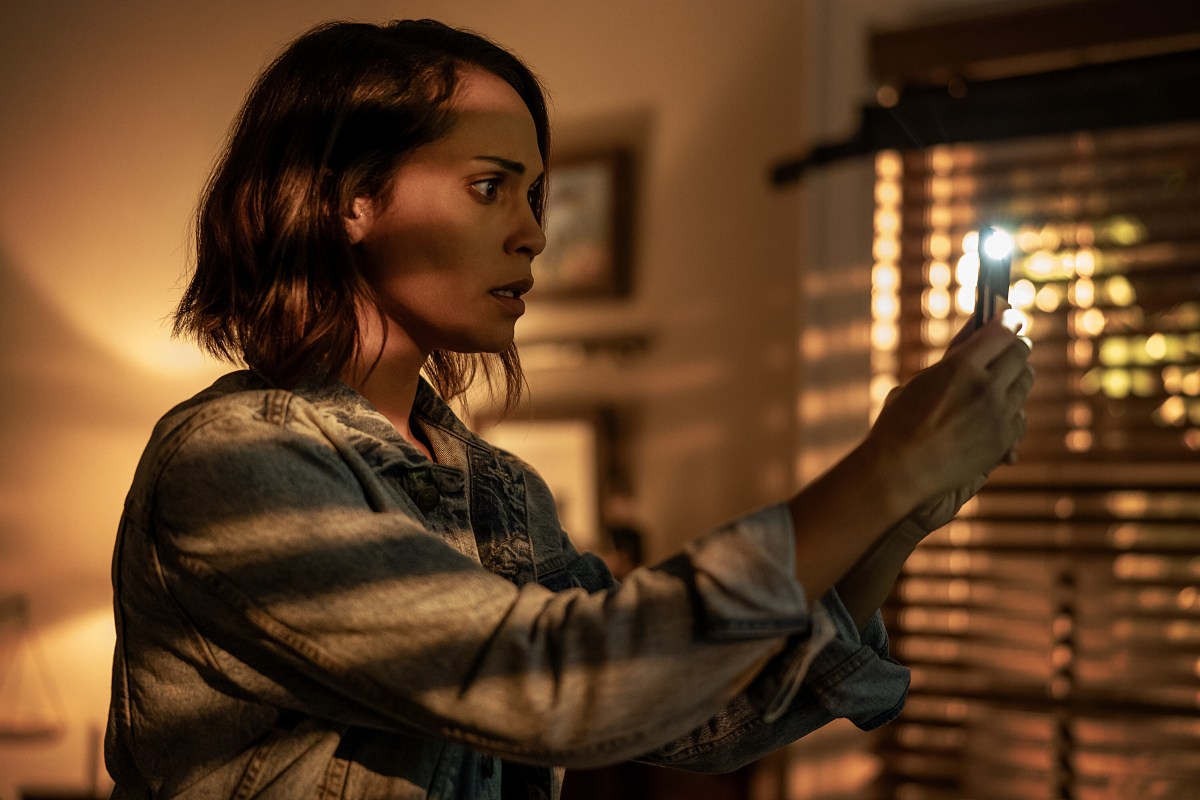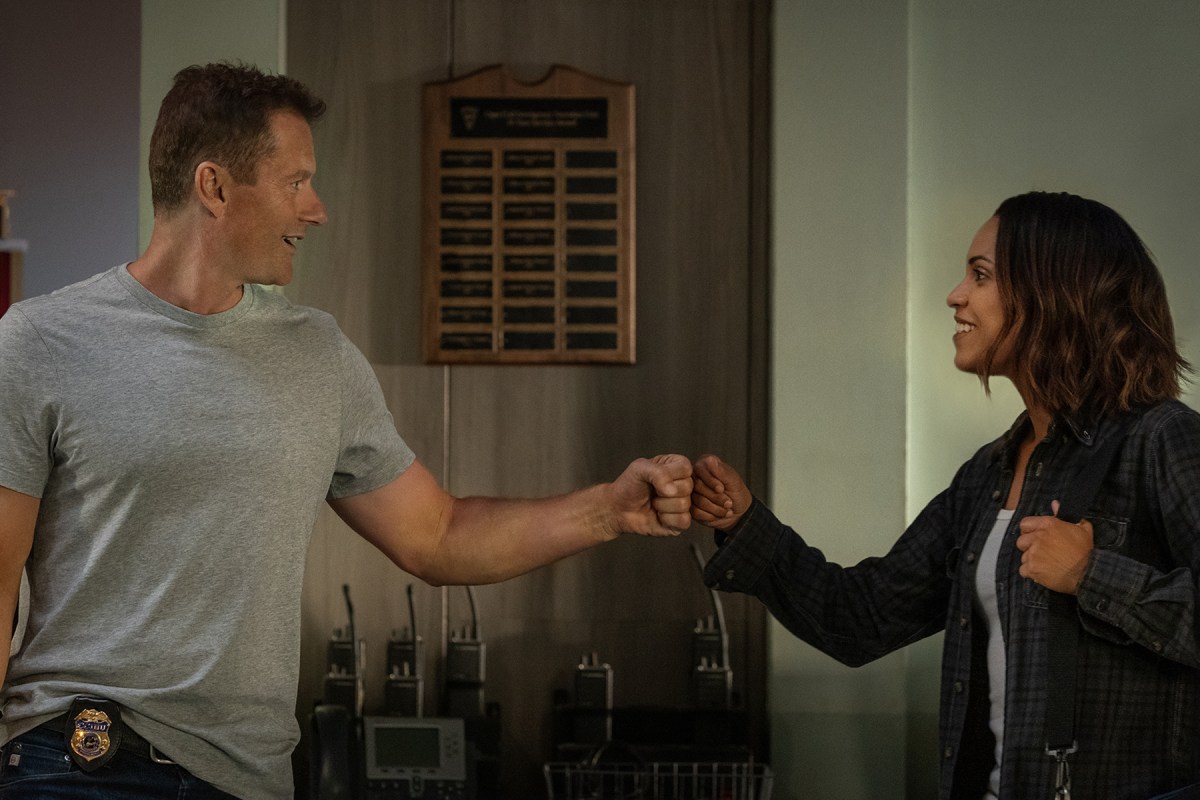This review contains mild spoilers for Hightown season three.
Jackie Quiñones should’ve been on top of the world.
The Fisheries Service Agent turned Narcotics cop had finally caught her white whale: Frankie Cuevas (Amaury Nolasco) was on his way to prison. She’d finally gotten justice for Daisy. She’d helped arrest Charmaine Grasa (Imani Lewis), shutting down the pipeline of carfentanil onto the Cape. Things between her and her on-again, off-again “girlfriend” were seemingly on again, as Leslie (Tonya Glanz) admitted to having real feelings for Jackie…something Jackie wanted so desperately to hear. Things were good. But then — as is Jackie’s wont — she fucked it all up…again.
Charmaine escapes as Jackie and Leslie are transporting her to the women’s prison. The mistake threatens to ruin both of their careers but Leslie insists the fault lies entirely with Jackie. This blindside ends both their personal and professional relationships. Then — again, as is Jackie’s wont — she makes a bad situation worse by drinking, relinquishing the tenuous hold she’d had on her sobriety, and beginning her downward spiral. Jackie calls her partner, Ray, and admits she screwed everything up again. She begs him to tell her what to do.
“You go home, you go inside, and call me tomorrow,” he instructs. Ray assures her that everything will be alright. But all Jackie hears is “go inside” and so she does. Jackie ventures inside the home of her father’s lecherous drug dealer. That’s where we left Jackie — in the foyer of Petey’s drug den, worried she’d give in and trade sex for drugs — when Hightown‘s second season ended, 755 days ago.
For nearly two years, Starz has kept the fate of Jackie Quiñones a mystery. It’s a curious delay: the network renewed the series back in March 2022 and the third season went into production shortly thereafter. Seemingly, by mid-August 2022, the cast had wrapped on the third season. So what happened that Hightown, ostensibly, sat in a drawer for a year? I’m not sure we’ll ever know…but given the way we’ve seen networks and studios treat LGBT content recently — abruptly cancelling it, disappearing it from streaming services — it’s both disconcerting and noteworthy.
But even with its prolonged absence, Hightown hasn’t changed, much to my chagrin.

Jackie reappears on our screens, lying passed out in the dunes. She’s nudged awake by some curious kids but she can’t recall where she is, how she got there, or anything that’d happened in the preceding day. Jackie is rudderless: without a big white whale like Frankie Cuevas to chase, nothing excites her anymore and she fills that empty space with drugs and alcohol (which she gets — thank goodness — without sleeping with Petey, despite season two’s inference). Jackie goes through the motions at work, having kept her position with the state police thanks, no doubt, to her friendship with Ray. (Leslie, on the other hand, has been demoted to highway patrol.) Even the prospect of taking down the drug kingpin responsible for the carfentanil flooding the Cape doesn’t excite her. She shows up to the bust out of obligation and high as a kite, the call having interrupted a night of dancing, flirting, drinking and snorting coke.
(That no one seems to notice that she’s high…well…that doesn’t speak well to the capability of the Cape Cod Interagency Narcotics Unit.)
Throughout its run, Hightown has been skilled at showing that the gap between the police and the policed isn’t nearly as wide as the world would have you believe. The hypocrisy of the police — Jackie using drugs just as she’s about to raid the home of the kingpin who may have provided it or Ray’s harboring of a criminal even as he tries to lock others up — is on full display. The show reaffirms that how we police is a choice. Newly sober, Jackie is forced to ask herself what kind of officer she truly wants to be: one who skirts the rules or one who plays by the book. It is the central question for her character this season.
But where the show falls short, consistently, is engaging with the racial dynamics of drug use and policing. Little time is spent reflecting on who gets arrested and who gets treatment or which victims warrant police attention and which don’t. In the absence of directly grappling with those issues, Hightown makes its own statement, however unwittingly: making people of color (and, particularly, immigrants of color) — Charmaine, Osito, Jorge and Frankie Cuevas — responsible for the mostly white overdose deaths on the Cape. I’d hoped that the introduction of the Farleys this season would seek to reset that narrative but, clearly, Hightown does not want to be that show.

At times, season three’s Jackie feels like a regression: the non-stop partying, the drug and alcohol use, and the interactions with Provincetown’s LGBTQ community feel like callbacks to the first season version of Jackie, as if the character hasn’t evolved at all. Much like in season one, when Jackie fixated on Sherry Henry and finding the person who killed her, she fixates this season on Veronica, the girl she bedded but can’t remember, whose bloody shirt she finds in the backseat of her Jeep. Jackie remains, as she always has been, the patron saint of lost causes.
Monica Raymund’s Jackie has always been Hightown‘s most compelling character. Raymund charms as Jackie. Even as she’s in the throes of her latest attempt at self-destruction, Jackie never feels irredeemable. There’s a point, midway through the new season, where Jackie finally hits her rock bottom. She confesses to Ed — her surrogate father from her Fishery days — that she’s a screw-up but she doesn’t want to be like this anymore. She hurt someone and she cannot abide being that person (read: being like her father). It’s a masterful performance from Raymund but I found myself remiss it’d come so late in the series. In hindsight, it feels like evidence that Hightown never fully appreciated the complexity that Raymund brings to the character. In her review of the show’s first season, Kayla noted, “sometimes it feels like Hightowndoesn’t know what its own strengths are,” and that remains true in its final season.
Given the opportunity to focus on Jackie — to build out her world, to deepen her connections with others — the show has always opted not to; instead, they just bring on more men. This season, in addition to storylines for feuding police officers, Ray and Alan, and rival gangsters, Osito and Frankie, the show adds Owen Frawley and his uncle, Shane (Michael Drayer and Garret Dillahunt), South Boston transplants looking expand their territory into the Cape. This show did not need more people. What’s more: the characters are siloed — each operating independently, rather than working together — so their stories require even more screentime. With those demands, it becomes virtually impossible, even with the best writers and a talented cast, to tell all those stories well. There just isn’t time.
Hightown could’ve been something more. The potential was there, particularly with Raymund as the show’s lead. But instead, it wraps up its three season run as entertaining but middling fare and as a show that never understood how good it could be.
Hightown season three premieres tonight on Starz.



So when you say Jackie’s character has regressed does that mean she’s back to having casual sex with women or even men again?
Oh please…. here we go again with the freaking race! Addiction doesn’t discriminate what don’t you get about that they don’t need to go into detail about it 95% of Americans understand addiction as we all have somebody close to us who we’ve lost who are is in the throws of it!
I loathe when final seasons lazily introduce new characters. It’s completely unnecessary! We’ve been on this journey with the already established characters. Shows that I really liked have been guilty of this ( Shameless, Orange Is The New Black) and I find it extremely unfair to those of us with investments in the stories these shows are trying to tell.
I’ve been looking forward to this for a long time and look forward to canceling starz ( which was once a great service) as soon as ot ends.
I’ve been looking forward to this for a long time and look forward to canceling starz ( which was once a great service) as soon as ot ends.
I’ve been looking forward to this for a long time and look forward to canceling starz ( which was once a great service) as soon as ot ends.
Regards: Spotiwire
I’ve been anticipating this for a while and can’t wait to terminate Starz, a fantastic service in the past, as soon as it concludes.
This is amazing thanks for sharing this blog I have become a fan of your blogs now. This blog is so interesting and informative.